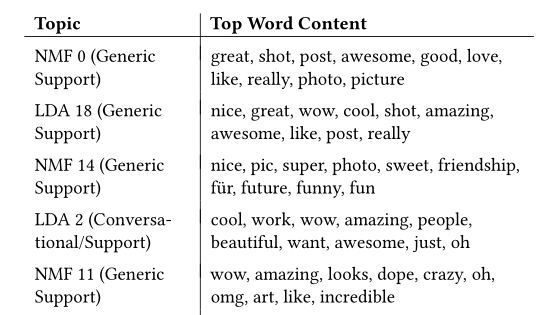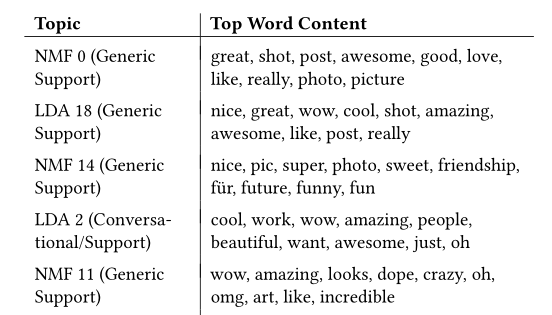Instagram ‘pods’ game the algorithm by coordinating likes and comments on millions of posts

Researchers at NYU have identified hundreds of groups of Instagram users, some with thousands of members, that systematically exchange likes and comments in order to game the service’s algorithms and boost visibility. In the process, they also trained machine learning agents to identify whether a post has been juiced in this way.
“Pods,” as they’ve been dubbed, straddle the line between real and fake engagement, making them tricky to detect or take action against. And while they used to be a niche threat (and still are compared with fake account and bot activity), the practice is growing in volume and efficacy.
Pods are easily found via searching online, and some are open to the public. The most common venue for them is Telegram, as it’s more or less secure and has no limit to the number of people who can be in a channel. Posts linked in the pod are liked and commented on by others in the group, with the effect of those posts being far more likely to be spread widely by Instagram’s recommendation algorithms, boosting organic engagement.
Reciprocity as a service
The practice of groups mutually liking one another’s posts is called reciprocity abuse, and social networks are well aware of it, having removed setups of this type before. But the practice has never been studied or characterized in detail, the team from NYU’s Tandon School of Engineering explained.
“In the past they’ve probably been focused more on automated threats, like giving credentials to someone to use, or things done by bots,” said lead author of the study Rachel Greenstadt. “We paid attention to this because it’s a growing problem, and it’s harder to take measures against.”
On a small scale it doesn’t sound too threatening, but the study found nearly 2 million posts that had been manipulated by this method, with more than 100,000 users taking part in pods. And that’s just the ones in English, found using publicly available data. The paper describing the research was published in the Proceedings of the World Wide Web Conference and can be read here.
Importantly, the reciprocal liking does more than inflate apparent engagement. Posts submitted to pods got large numbers of artificial likes and comments, yes, but that activity deceived Instagram’s algorithm into promoting them further, leading to much more engagement even on posts not submitted to the pod.
When contacted for comment, Instagram initially said that this activity “violates our policies and we have numerous measures in place to stop it,” and said that the researchers had not collaborated with the company on the research.
In fact the team was in contact with Instagram’s abuse team from early on in the project, and it seems clear from the study that whatever measures are in place have not, at least in this context, had the desired effect. I pointed this out to the representative and will update this post if I hear back with any more information.
“It’s a grey area”
But don’t reach for the pitchforks just yet — the fact is this kind of activity is remarkably hard to detect, because really it’s identical in many ways to a group of friends or like-minded users engaging with each others’ content in exactly the way Instagram would like. And really, even classifying the behavior as abuse isn’t so simple.
“It’s a grey area, and I think people on Instagram think of it as a grey area,” said Greenstadt. “Where does it end? If you write an article and post it on social media and send it to friends, and they like it, and they sometimes do that for you, are you part of a pod? The issue here is not necessarily that people are doing this, but how the algorithm should treat this action, in terms of amplifying or not amplifying that content.”
Obviously if people are doing it systematically with thousands of users and even charging for access (as some groups do), that amounts to abuse. But drawing the line isn’t easy.
More important is that the line can’t be drawn unless you first define the behavior, which the researchers did by carefully inspecting the differences in patterns of likes and comments on pod-boosted and ordinary posts.
“They have different linguistic signatures,” explained co-author Janith Weerasinghe. “What words they use, the timing patterns.”
As you might expect, strangers obligated to comment on posts they don’t actually care about tend to use generic language, saying things like “nice pic” or “wow” rather than more personal remarks. Some groups actually warn against this, Weerasinghe said, but not many.
The list of top words used reads, predictably, like the comment section on any popular post, though perhaps that speaks to a more general lack of expressiveness on Instagram than anything else:
 But statistical analysis of thousands of such posts, both pod-powered and normal, showed a distinctly higher prevalence of “generic support” comments, often showing up in a predictable pattern.
But statistical analysis of thousands of such posts, both pod-powered and normal, showed a distinctly higher prevalence of “generic support” comments, often showing up in a predictable pattern.
This data was used to train a machine learning model, which when set loose on posts it had never seen, was able to identify posts given the pod treatment with as high as 90% accuracy. This could help surface other pods — and make no mistake, this is only a small sample of what’s out there.
“We got a pretty good sample for the time period of the easily accessible, easily findable pods,” said Greenstadt. “The big part of the ecosystem that we’re missing is pods that are smaller but more lucrative, that have to have a certain presence on social media already to join. We’re not influencers, so we couldn’t really measure that.”
The numbers of pods and the posts they manipulate has grown steadily over the last two years. About 7,000 posts were found during March of 2017. A year later that number had jumped to nearly 55,000. March of 2019 saw over 100,000, and the number continued to increase through the end of the study’s data. It’s safe to say that pods are now posting over 4,000 times a day — and each one is getting a large amount of engagement, both artificial and organic. Pods now have 900 users on average, and some had over 10,000.
You may be thinking: “If a handful of academics using publicly available APIs and Google could figure this out, why hasn’t Instagram?”
As mentioned before, it’s possible the teams there have simply not considered this to be a major threat and consequently have not created policies or tools to prevent it. Rules proscribing using a “third party app or service to generate fake likes, follows, or comments” arguably don’t apply to these pods, since in many ways they’re identical to perfectly legitimate networks of users (though Instagram clarified that it considers pods as violating the rule). And certainly the threat from fake accounts and bots is of a larger scale.
And while it’s possible that pods could be used as a venue for state-sponsored disinformation or other political purposes, the team didn’t notice anything happening along those lines (though they were not looking for it specifically). So for now the stakes are still relatively small.
That said, Instagram clearly has access to data that would help to define and detect this kind of behavior, and its policies and algorithms could be changed to accommodate it. No doubt the NYU researchers would love to help.
Facebook Faces Yet Another Outage: Platform Encounters Technical Issues Again

Uppdated: It seems that today’s issues with Facebook haven’t affected as many users as the last time. A smaller group of people appears to be impacted this time around, which is a relief compared to the larger incident before. Nevertheless, it’s still frustrating for those affected, and hopefully, the issues will be resolved soon by the Facebook team.
Facebook had another problem today (March 20, 2024). According to Downdetector, a website that shows when other websites are not working, many people had trouble using Facebook.
This isn’t the first time Facebook has had issues. Just a little while ago, there was another problem that stopped people from using the site. Today, when people tried to use Facebook, it didn’t work like it should. People couldn’t see their friends’ posts, and sometimes the website wouldn’t even load.
Downdetector, which watches out for problems on websites, showed that lots of people were having trouble with Facebook. People from all over the world said they couldn’t use the site, and they were not happy about it.
When websites like Facebook have problems, it affects a lot of people. It’s not just about not being able to see posts or chat with friends. It can also impact businesses that use Facebook to reach customers.
Since Facebook owns Messenger and Instagram, the problems with Facebook also meant that people had trouble using these apps. It made the situation even more frustrating for many users, who rely on these apps to stay connected with others.
During this recent problem, one thing is obvious: the internet is always changing, and even big websites like Facebook can have problems. While people wait for Facebook to fix the issue, it shows us how easily things online can go wrong. It’s a good reminder that we should have backup plans for staying connected online, just in case something like this happens again.
Christian family goes in hiding after being cleared of blasphemy

LAHORE, Pakistan — A court in Pakistan granted bail to a Christian falsely charged with blasphemy, but he and his family have separated and gone into hiding amid threats to their lives, sources said.
Haroon Shahzad, 45, was released from Sargodha District Jail on Nov. 15, said his attorney, Aneeqa Maria. Shahzad was charged with blasphemy on June 30 after posting Bible verses on Facebook that infuriated Muslims, causing dozens of Christian families in Chak 49 Shumaali, near Sargodha in Punjab Province, to flee their homes.
Lahore High Court Judge Ali Baqir Najfi granted bail on Nov. 6, but the decision and his release on Nov. 15 were not made public until now due to security fears for his life, Maria said.
Shahzad told Morning Star News by telephone from an undisclosed location that the false accusation has changed his family’s lives forever.
“My family has been on the run from the time I was implicated in this false charge and arrested by the police under mob pressure,” Shahzad told Morning Star News. “My eldest daughter had just started her second year in college, but it’s been more than four months now that she hasn’t been able to return to her institution. My other children are also unable to resume their education as my family is compelled to change their location after 15-20 days as a security precaution.”
Though he was not tortured during incarceration, he said, the pain of being away from his family and thinking about their well-being and safety gave him countless sleepless nights.
“All of this is due to the fact that the complainant, Imran Ladhar, has widely shared my photo on social media and declared me liable for death for alleged blasphemy,” he said in a choked voice. “As soon as Ladhar heard about my bail, he and his accomplices started gathering people in the village and incited them against me and my family. He’s trying his best to ensure that we are never able to go back to the village.”
Shahzad has met with his family only once since his release on bail, and they are unable to return to their village in the foreseeable future, he said.
“We are not together,” he told Morning Star News. “They are living at a relative’s house while I’m taking refuge elsewhere. I don’t know when this agonizing situation will come to an end.”
The Christian said the complainant, said to be a member of Islamist extremist party Tehreek-e-Labbaik Pakistan and also allegedly connected with banned terrorist group Lashkar-e-Jhangvi, filed the charge because of a grudge. Shahzad said he and his family had obtained valuable government land and allotted it for construction of a church building, and Ladhar and others had filed multiple cases against the allotment and lost all of them after a four-year legal battle.
“Another probable reason for Ladhar’s jealousy could be that we were financially better off than most Christian families of the village,” he said. “I was running a successful paint business in Sargodha city, but that too has shut down due to this case.”
Regarding the social media post, Shahzad said he had no intention of hurting Muslim sentiments by sharing the biblical verse on his Facebook page.
“I posted the verse a week before Eid Al Adha [Feast of the Sacrifice] but I had no idea that it would be used to target me and my family,” he said. “In fact, when I came to know that Ladhar was provoking the villagers against me, I deleted the post and decided to meet the village elders to explain my position.”
The village elders were already influenced by Ladhar and refused to listen to him, Shahzad said.
“I was left with no option but to flee the village when I heard that Ladhar was amassing a mob to attack me,” he said.
Shahzad pleaded with government authorities for justice, saying he should not be punished for sharing a verse from the Bible that in no way constituted blasphemy.
Similar to other cases
Shahzad’s attorney, Maria, told Morning Star News that events in Shahzad’s case were similar to other blasphemy cases filed against Christians.
“Defective investigation, mala fide on the part of the police and complainant, violent protests against the accused persons and threats to them and their families, forcing their displacement from their ancestral areas, have become hallmarks of all blasphemy allegations in Pakistan,” said Maria, head of The Voice Society, a Christian paralegal organization.
She said that the case filed against Shahzad was gross violation of Section 196 of the Criminal Procedure Code (CrPC), which states that police cannot register a case under the Section 295-A blasphemy statute against a private citizen without the approval of the provincial government or federal agencies.
Maria added that Shahzad and his family have continued to suffer even though there was no evidence of blasphemy.
“The social stigma attached with a blasphemy accusation will likely have a long-lasting impact on their lives, whereas his accuser, Imran Ladhar, would not have to face any consequence of his false accusation,” she said.
The judge who granted bail noted that Shahzad was charged with blasphemy under Section 295-A, which is a non-cognizable offense, and Section 298, which is bailable. The judge also noted that police had not submitted the forensic report of Shahzad’s cell phone and said evidence was required to prove that the social media was blasphemous, according to Maria.
Bail was set at 100,000 Pakistani rupees (US $350) and two personal sureties, and the judge ordered police to further investigate, she said.
Shahzad, a paint contractor, on June 29 posted on his Facebook page 1 Cor. 10:18-21 regarding food sacrificed to idols, as Muslims were beginning the four-day festival of Eid al-Adha, which involves slaughtering an animal and sharing the meat.
A Muslim villager took a screenshot of the post, sent it to local social media groups and accused Shahzad of likening Muslims to pagans and disrespecting the Abrahamic tradition of animal sacrifice.
Though Shahzad made no comment in the post, inflammatory or otherwise, the situation became tense after Friday prayers when announcements were made from mosque loudspeakers telling people to gather for a protest, family sources previously told Morning Star News.
Fearing violence as mobs grew in the village, most Christian families fled their homes, leaving everything behind.
In a bid to restore order, the police registered a case against Shahzad under Sections 295-A and 298. Section 295-A relates to “deliberate and malicious acts intended to outrage religious feelings of any class by insulting its religion or religious beliefs” and is punishable with imprisonment of up to 10 years and fine, or both. Section 298 prescribes up to one year in prison and a fine, or both, for hurting religious sentiments.
Pakistan ranked seventh on Open Doors’ 2023 World Watch List of the most difficult places to be a Christian, up from eighth the previous year.
Morning Star News is the only independent news service focusing exclusively on the persecution of Christians. The nonprofit’s mission is to provide complete, reliable, even-handed news in order to empower those in the free world to help persecuted Christians, and to encourage persecuted Christians by informing them that they are not alone in their suffering.
Free Religious Freedom Updates
Join thousands of others to get the FREEDOM POST newsletter for free, sent twice a week from The Christian Post.
Individual + Team Stats: Hornets vs. Timberwolves
CHARLOTTE HORNETS MINNESOTA TIMBERWOLVES You can follow us for future coverage by liking us on Facebook & following us on X: Facebook – All Hornets X – …
Source link
-

 MARKETING6 days ago
MARKETING6 days agoRoundel Media Studio: What to Expect From Target’s New Self-Service Platform
-

 SEO6 days ago
SEO6 days agoGoogle Limits News Links In California Over Proposed ‘Link Tax’ Law
-
SEARCHENGINES6 days ago
Daily Search Forum Recap: April 12, 2024
-

 SEO5 days ago
SEO5 days ago10 Paid Search & PPC Planning Best Practices
-

 SEARCHENGINES5 days ago
SEARCHENGINES5 days agoGoogle Core Update Volatility, Helpful Content Update Gone, Dangerous Google Search Results & Google Ads Confusion
-

 SEO7 days ago
SEO7 days agoGoogle Unplugs “Notes on Search” Experiment
-

 MARKETING6 days ago
MARKETING6 days ago2 Ways to Take Back the Power in Your Business: Part 2
-

 MARKETING4 days ago
MARKETING4 days ago5 Psychological Tactics to Write Better Emails














